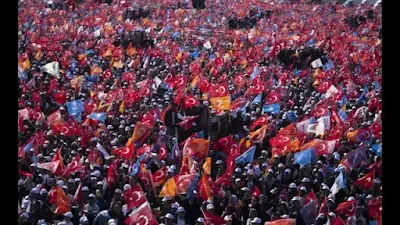The parties of Tayyip Erdogan and Kemal Kilicdaroglu, the opposition candidate, both seemed to be headed for a runoff in Turkey's presidential election, while insiders in both camps acknowledged they might not reach the required 50% of the vote to win outright.
Erdogan led by a wide margin in the early returns on Sunday, but as the count went on, his lead shrank as was to be predicted. A May 28 runoff seemed imminent, delaying the outcome of the president's 20 years in office.
Kilicdaroglu, the leader of a six-party coalition, held a modest advantage in polls conducted prior to the election, and two on Friday even put him above the 50% mark. However, the majority had predicted a slim margin.
Neither side declared a winner after rejecting the other side's count.
Erdogan advised poll officials to record all national results on Sunday, while Kilicdaroglu warned against hastily announcing election results while the counting is still ongoing.
There appears to be no winner in the first round, according to a senior official from the opposition coalition. But according to our data, Kilicdaroglu will take the lead.
Erdogan's party was filing challenges to the ballots, a senior opposition official told Reuters, delaying the release of the whole results. They are currently exerting every effort to prolong the procedure, he claimed.
According to statistics from the state-run Anadolu agency, Erdogan had a lead of 50.43% over Kilicdaroglu with roughly 80.5% of the ballots counted, but the opposition said the results were being released in a way that artificially enhanced Erdogan's lead.
One of the most significant elections in Turkey's 100-year history will take place on Sunday; the results might bring an end to Erdogan's tyrannical 20-year rule and have repercussions well beyond Turkey's borders.
The presidential election will determine not only who will lead the 85 million-person NATO member nation of Turkey, but also how it will be governed, where its economy is heading amid a severe crisis in the cost of living and the direction of its foreign policy.
Both sides' fans rejoiced in Ankara.
Erdogan-related posters were held up by a mob outside the AK Party (AKP) headquarters as they sang and danced.
"I've been at this celebration of our triumph since lunchtime. At the AKP headquarters, Davut, 25, raised Erdogan's flag and declared, "This is our day.
Around a thousand people had assembled at the CHP party headquarters of Kilicdaroglu, brandishing flags of Turkey's founder Mustafa Kemal Ataturk and pounding on drums.
Nurten, a 62-year-old university lecturer who works at the party's Istanbul headquarters, said: "We understood that the official news agency of the state would claim a significant lead over our alliance. Kilicdaroglu will win, in my opinion, and the contest will be decided in the first round.
The Middle East, NATO, and Moscow are all closely monitoring the elections, which are also for the parliament.
Erdogan is one of President Vladimir Putin's most significant partners; if he loses, the Kremlin will undoubtedly be alarmed, but the Biden administration and many Middle Eastern and European countries who had strained ties with Erdogan would likely be relieved.
Turkey's longest-serving leader has made the NATO member and second-largest nation in Europe a major participant on the world stage, modernized it with massive construction projects including new airports, bridges, and hospitals, and developed a defense industry in demand by other nations.
However, his erratic economic strategy of low-interest rates, which sparked a rising crisis in the cost of living and inflation, made him a target of voters' ire. Voters were further angered by his government's tardiness in responding to a catastrophic earthquake that struck southeast Turkey and claimed 50,000 lives.
By resurrecting democracy after years of state repression, reverting to conventional economic policies, strengthening institutions that lost autonomy under Erdogan's tight control, and repairing shaky connections with the West, Kilicdaroglu has vowed to change the path of Turkey.
If the opposition wins, thousands of political prisoners and activists may be let free.
Ahmet Kalkan, 64, who voted in Istanbul for Kilicdaroglu, echoed opponents who worry that Erdogan would rule in an increasingly dictatorial manner if he wins, saying, "I see these elections as a choice between democracy and dictatorship."
"I chose democracy, and I hope that my country chooses democracy," declared Kalkan, a retired worker in the health sector.
The 69-year-old Erdogan, who has won 12 elections, claims he respects democracy and rejects the notion that he is a tyrant.
Erdogan still represents the future, according to Mehmet Akif Kahraman, who cast his ballot in Istanbul, demonstrating the president's continued popularity.
Turkey will rule the globe, God willing, he remarked.
The People's Alliance, which includes Mustafa Kemal Ataturk's secular Republican People's Party (CHP) and other nationalist parties as well as Erdogan's Islamist-leaning AK Party (AKP), is competing against Kilicdaroglu's Nation Alliance, which is made up of six opposition parties.
Erdogan's alliance received 51.43% of the vote, compared to 33.93% for the opposition alliance, according to HaberTurk, which had over 70% of the ballots counted.
Erdogan enjoys fervent support from religious Turks who formerly felt excluded in secular Turkey, and his political career has endured multiple corruption scandals as well as an attempted coup in 2016.
However, if Turks do remove Erdogan, it will be mostly because of the reduction in their affluence and capacity to satisfy necessities brought on by inflation that reached 85% in October 2022 and the devaluation of the Turkish lira.
Most of Turkey's institutions are under Erdogan's strict control, and he has marginalized liberals and opponents. According to Human Rights Watch's World Report 2022, Erdogan's administration has significantly worsened Turkey's human rights record.
Kurdish voters, who make up 15–20% of the electorate, will be crucial since the Nation Alliance is unlikely to win a majority in parliament on its own.
Despite not being a part of the major opposition coalition, the pro-Kurdish Peoples' Democratic Party (HDP) vehemently opposes Erdogan because of a crackdown on its members in recent years.
